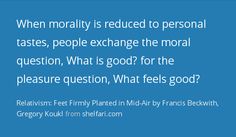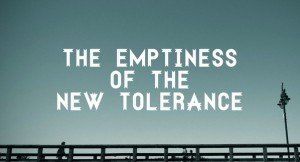A little over 2000 years ago a Roman procurator asked the question, “WHAT IS TRUTH?” [1] Today this question is rarely, if ever asked, with the exception of a witness in a trial—“Do you solemnly (swear/affirm) that you will tell the truth, the whole truth, and nothing but the truth, (so help you God/under pains and penalties of perjury)?”
To speak of truth, or to inject a truth claim into a conversation today, is tantamount to heresy, and is usually met with a ferocious attack by relativist proponents. Philosopher Peter Kreeft observes that of all the symptoms of decay in our culture, relativism is the most disastrous. It is, in the words of Michael Novak, “an invisible gas, odorless and deadly, that is polluting every free society on earth.” C. S. Lewis called it “the disease that will certainly end our species (and… damn our souls) if it is not crushed.” And as William Gairdner notes, “Ironically, relativism has become our only absolute.”[2]
But what is relativism? Here are two definitions:
Relativism is the philosophical position that all points of view are equally valid and that all truth is relative to the individual. This means that all moral positions, all religious systems, all art forms, all political movements, etc., are truths that are relative to the individual.
Relativism is the belief that there’s no absolute truth, only the truths that a particular individual or culture happen to believe. If you believe in relativism, then you think different people can have different views about what’s moral and immoral.
Relativism may be a philosophical position, but is it a tenable one? Can all points of view be equally valid as the relativist worldview claims? If so, does this mean that Mother Teresa’s point of view and that of Hitlers,’ are equally valid? Or that of Pol Pot and John Paul ll? It doesn’t take many examples to realize that the relativist worldview is bankrupt of logical consistency, empirical adequacy, and experiential relevance. Contrary beliefs can exist, contrary truths cannot.
 The problem with relativism is that it is self-refuting, and as such, cannot be lived. Ask anyone who espouses relativism if it is true that all things are relative? If they say yes, then simply ask the question, “Well, is the statement you just made relative? If it is, and it has to be under your definition of relativism, then it is simply your opinion, and why should I value your opinion over mine or anyone else’s for that matter.” So if relativism is untenable, then objective truth must be the ethical and moral bedrock on which the universe was created, regardless of whether a person chooses to believe it or not.
The problem with relativism is that it is self-refuting, and as such, cannot be lived. Ask anyone who espouses relativism if it is true that all things are relative? If they say yes, then simply ask the question, “Well, is the statement you just made relative? If it is, and it has to be under your definition of relativism, then it is simply your opinion, and why should I value your opinion over mine or anyone else’s for that matter.” So if relativism is untenable, then objective truth must be the ethical and moral bedrock on which the universe was created, regardless of whether a person chooses to believe it or not.
Author and Chair of Philosophy and Ethics at Palm Beach Atlantic University, Paul Copan stated, “Truth is true—even if no one knows it. Truth is true—even if no one admits it. Truth is true—even if no one agrees what it is. Truth is true—even if no one follows it. Truth is true— even if no one but God grasps it fully.”[3] Winston Churchill concurs, “Truth is incontrovertible. Malice may attack it and ignorance may deride it, but, in the end, there it is.”
In his book, The Turn of the Tide, Prof Keith Ward offers the following observation:
Alan Bloom explains how relativism has become one of the crowning virtues of our age:
“Relativism is necessary to openness; and this is the virtue, the only virtue, which all primary education for more than fifty years has dedicated itself to inculcating. Openness–and the relativism that makes it the only plausible stance in the face of various claims to truth . . .–is the great insight of our times.”[5]
However, this “great insight” is having a devastating effect on today’s Western culture/society as it is permeating the very fabric of society and influencing how people think and consequently act. Calling the conflict between relativism and objectivism “the central cultural opposition of our time,” author and philosopher, Richard J. Bernstein reports that the result of this conflict is that, “There is an uneasiness that has spread throughout intellectual and cultural life. It affects almost every discipline and every aspect of culture” (see footnote below)
William Lane Craig gives the somber warning as to where relativism, when applied to religious dialogue, leads:
Relativism and tolerance, as it has been redefined, are the two crowning virtues of Western culture today. But how has this redefining process been accomplished?
 In his milestone book, The Intolerance of Tolerance, D. A. Carson states, “The political left controls culture (the media, entertainment, education, and politics). The new tolerance is a cultural force, not an intellectual force.”[7]
In his milestone book, The Intolerance of Tolerance, D. A. Carson states, “The political left controls culture (the media, entertainment, education, and politics). The new tolerance is a cultural force, not an intellectual force.”[7]
In his article, Why the ‘New’ Tolerance Is Actually Intolerant, Mark Driscoll offers the following comparison between the old view of tolerance, that being its original and true meaning, and the new view of tolerance, that being the redefining of the original and true meaning to fit the relativist worldview:
The old view of tolerance assumed that:
(1) there is objective truth that can be known;
(2) various people, groups and perspectives each think they know what that objective truth is and
(3) as people/groups disagree, dialogue and debate their conflicting views of the truth, everyone involved will have an opportunity to learn, grow, change and possibly arrive together at the truth.
The new view of tolerance assumes that:
(1) there is no objective truth that can be known;
(2) various people, groups and perspectives do not have the truth but only what they believe to be the truth and
(3) various people, groups and perspectives should not argue and debate their disagreements because there is no truth to be discovered, and to assume otherwise only leads to needless conflicts and prejudices….the new tolerance…denies moral absolutes while holding to the moral absolute that there is no moral absolute. I know that’s confusing. It’s like saying, “There is no such thing as absolute truth”—to which the question should be asked, “So does that mean you’re lying when you want us to believe your absolute statement that truth does not exist?” You cannot say absolutely that there are no absolutes. I hope you see that the statement itself saws off the very limb it’s sitting on.[8]
Defining Truth and Relativism-Norman Geisler
Relativism Refutes Itself-William Lane Craig
How Can Christians Demonstrate Tolerance–Greg Koukl-str.org
Are Christians Intolerant?-Greg Koukl
Relativism: Feet Firmly Planted in Mid-Air-Francis Beckwith and Greg Koukl
Other articles re relativism/redefining of tolerance:
True for you, but not for me-but can that be true?-by Lane Davis-article here
“That’s true for you, but not for me.” (Relativism)-by Paul Copan-article here
Is There an Absolute Truth?-J. Warner Wallace-article here
Notes:
[1] Bible, John 18:38
[2] William Gairdner, The Book of Absolutes, MQUP, 2008
[3] Paul Copan, True for You, But Not for Me, Minneapolis: Bethany House, 1998
[4] Keith Ward, The Turn of the Tide, p 144 (BBC)
[5] Alan Bloom, The Closing of the American Mind, New York: Simon & Schuster, 1987, p. 26. Calling the conflict between relativism and objectivism “the central cultural opposition of our time,” Bernstein reports that as a result of this conflict “There is an uneasiness that has spread throughout intellectual and cultural life. It affects almost every discipline and every aspect of culture” (Richard J. Bernstein, Beyond Objectivism and Relativism, Oxford: Basil Blackwell, 1983, pp. 7, 1.
[6] William Lane Craig, Politically Incorrect Salvation, article can be found, here
[7] D. A. Carson, The Intolerance of Tolerance, Wm. B. Eerdmans Publishing Co., 2012, p. 104
[8] Mark Driscoll, Why the ‘New’ Tolerance is Actually Intolerant, (see link above for the complete article)
